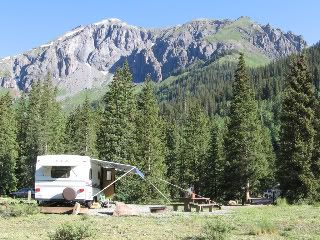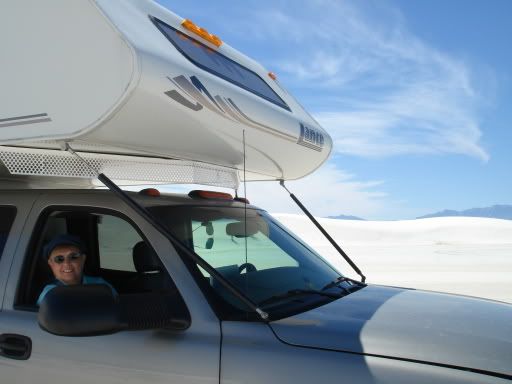Toyman01 wrote:
In reply to alfadriver:
There aren't any hotels where I like to stay. 
 The Ecoboost is still a long way from ever being a swap candidate, isn't it? What are the chances of anyone ever cracking the ECU reliably?
The Ecoboost is still a long way from ever being a swap candidate, isn't it? What are the chances of anyone ever cracking the ECU reliably?
For some reason, I don't remember the KOA in the middle of Kansas looking quite like that. 
On the other hand, I do remember the view from the Lodge just a mile down the road from that campground. (actually we kept the camper for local stuff in SE Idaho).
245 hp? Geez. Unless you are married to that transmission, it's easy to get a new one that would be matched to deliver similar performance. For all of those who say that the EB 3.5l is anemic, I think you forget how slow old trucks were. A modern 5.4l would be a lot better than that, and it can tow all day long. It's biggest problem is that the chevy truck engine is an easier swap.
Can't say about when an actual 3.5l crate motor would be available. No idea.
I've done a lot of the projectMPG suggestions, but I didn't do any before and after testing. Usually I drive this thing so little fuel economy wasn't a concern. In all honesty, it still isn't. This is more of a bench build.
Could a megasquirt improve economy over the factory ECU?

In reply to Toyman01:
Yes, megasquirt in conjunction with a wideband opens the door for some improvement. A lot of older vehicles (and even new ones if you're at or near WOT) run quite rich in an effort to protect against variances between production engines. Put some time into a tune focusing on keeping the AFRs at or above stoich at a cruise and massage the timing to match, and you will pick up quite a bit. I don't think I've had a megasquirt project that didn't pick up 3-4 mpg average, but that might also be a relation to the kinds of projects I approach. Who knows.
The downside there is it still isn't going to get you much improvement towing, since you'll be up on the torque curve hauling a heavy trailer, and will still want some safety margin and want to make good power. The laws of physics are pretty rigid in that you have to inject fuel to make that power. There may be some opportunity, since I don't know how mild the factory Ford tunes are, but I wouldn't expect too much when towing. That's where a diesel starts sounding better.
In reply to Toyman01:
Since this swap is no way going to happen before your trip- what you need to do now is see what the truck is asking of your current engine. Engine speed and MAP should at least give you an idea to figure out how it's running, but if you can get a recorder (that I forgot about some time ago) to record the engine data as it's running, then you can get a really good idea of how much power you are using to do what you need.
From there, you can figure out ways to either make you current engine more efficient at doing that exact thing OR calculate a full powertrain swap that can deliver that range of power more efficiently.
I keep using Power for a reason- that's fuel flow, and that's is keep the vehicle moving.
IF you can record data every second- plot speed-AM charts and speed-load charts, a/f charts, spark charts- which should put together a pretty solid set of what your truck actually needs.

dj06482
SuperDork
6/23/15 7:32 a.m.
A vacuum gauge is a poor man's fuel economy gauge. And it's one of the few mods you can make that may pay for itself in ROI.
I was going to say opening up things on the intake and exhaust side of your current engine may net you some gains, but will likely not pay off over the course of the trip. Other basics like making sure your tires are inflated properly should help, as well.
Likely your biggest opportunity for savings would be if you could plan ahead and purchase large quantities of gas (I hope you have something like a 40 gallon tank) where it's cheapest. Map out the BJ's and Costco gas stations along your route 
Air in and air out.
Block up the front and clean up the air around and under it.
Basic tune up if it's been "awhile"....
The 300 has an Irish drinking problem...

Ian F
MegaDork
6/23/15 9:41 a.m.
In reply to Ranger50:
Would opening up the exhaust help any? Headers, free-flow cats and a low restriction cat-back. While I imagine the intake on modern V8's has improved a lot since the 70's, when I had my '78 F150 with a 400, I was told by others who owned similar trucks and engines that the 10 mpg I was getting would improve a bit with headers and by replacing the 500 cfm 2v carb with a 650 cfm 4v with primaries and secondaries.
While I love the 300 six, there's not a chance it will get better mileage.
A big, underworked engine will use less fuel than a small, overworked engine.
My wife's old F-150 had a 300 with a 5-speed, it only got one or two mpg better than my F-250 with a 460 and automatic. Not worth the savings in fuel to be stuck in the slow lane with your hazards on, trying to get up a hill.
Based on how a 460EFi will pull, I'd bet Ford underrated that engine just a bit. the 460 in our Lincoln makes 500lb/ft (allegedly) I can't see it getting worse with fuel injection, better heads and a 30-year newer cam design.
Trans_Maro wrote:
In reply to Stealthtercel:
Where is the torque peak on that 2.7L?
I bet it's nowhere close to 2000rpm like it is on a 460.
3000rpm. Not THAT bad.....
In reply to Tom_Spangler:
Way better than I expected actually!
I'll echo the "clean it up" crowd. The cleaner the airflow the better. The less rolling resistance the better. The easier for the engine to breath the better. The less weight the better.
And here is a biggie, patience.
How fast are you planning to drive? The faster you ask the air molecules to get out of your way the more gas you're going to burn. On a nice long drive like this I'd experiment with different speeds and see what the sweet spot is for consumption. You may find (for instance) that 60 is too slow and lugs and 70 is deep into the throttle nearly all the time so that 65 yields your best result.
Yeah I'd be looking at aero mods at this point. Invest in stickers and yarn. Oh! And fiberglass! 
In reply to KyAllroad:
I've been doing similar experiments with my '98 Chevy 1-ton cargo van, here's what I've found with it:
55-60 MPH minimal wind/minimal load 17mpg
70-80 MPH strong winds/500lbs(inside the van) 7mpg
55-60 MPH minimal winds/Miata on open trailer 10mpg
70-75 MPH minimal winds/empty 12' box trailer 9mpg
55-60 MPH minimal winds/loaded 12' box trailer(about 1000lbs) 11mpg
So speed/wind seems to make a huge difference with my van, that only gets worse as weight is added. Not surprising, at all. 
I spent some time looking for a aero bumper cover for it. They don't seem to make anything for it.
The plan for this trip is to keep my foot out of it. I managed 11+ mpg the other day on a 80 mile run. I ran it up the interstate for a hour after changing all the hoses and radiator. At 70, I managed about 9, but I had a rear break drum dragging enough to stink so that probably cost me some.
I had considered building a diverter to direct air up and over the camper, but as short as it is, I wonder how much that will help.

I was on a camper forum where a fellow had made an airdam that attached to the underside of the camper cabover and almost touched the cab.
It was a V shape and directed air to each side of the camper above the cab.
I think he made it from lawn edging or rain gutter or something similar.
Apparently he got good results too.
Might be worth the couple bucks it would cost to try it out.
Shawn

NGTD
UltraDork
6/23/15 5:51 p.m.
My short term suggestion. Experiment a little and find the speed that gives the best mph. My Golf is much happier at 110 km/h (approx 70 mph) then it is at 120 km/h (75 mph) from a fuel economy standpoint. I bet with the wind you are pushing, staying around 60 mph will be better. But depending on gearing the sweet spot might move around.
Long-term - swap or newer truck. The new ones have much better power and economy.
In reply to Toyman01:
Anything you can do to keep the air from going between the cab and the camper will help. Keeping air out from under the front would help quite a bit too. Also, I bet some of those stick-on "vortex generators" on eBay may help along the back edge of the camper, but that would also depend on how tall your trailer load is - i.e. boat vs. Sammy.

Knurled
UltimaDork
6/23/15 6:34 p.m.
JKady wrote:
You're not gonna pull that kinda MPG in a truck that heavy and have any power to tow with a gasser. Physics doesn't work that way. The Ecoboost struggles to pull its rated numbers in its home application, let alone a truck much much heavier. Also having driven a few, they're not that impressive power wise if you're used to a big block.
I would not doubt if a new F150 weighed more than an old F250.
New trucks are PIGS. Heck, the shop '03 Silverado weighs something like 5500-6000lb empty, and it's a half ton.
Maybe that's why the 4.8 feels like a complete wimp compared to the old 5.7 truck, ya think?
In reply to Trans_Maro:
Hmm. That's an interesting idea.
Knurled,
I think my truck tips the scales at 7100 pounds. In this day and age, that's not too bad.
Some other stuff came to mind. If you haven't already, synthetics in the diffs, wheel bearings, u joints, transmission, t case, etc. have been known to show some gain, some claim as much as 1-2mpg. If you have a mechanical fan, consider replacing it with an electric unit, also reportedly good for a point or so.
As for airflow, I'd hazard a guess you'd be better off smoothing out the air under the truck, versus trying to block it off.
In reply to Toyman01:
Found the thread: http://www.rv.net/forum/index.cfm/fuseaction/thread/tid/17575645.cfm
Picture from thread: 
He claims a 1.5-2mpg increase, not bad considering it's probably $20.00 in materials.

Enyar
Dork
6/25/15 11:51 a.m.
How much does the trailer and boat weigh? Once we know that we can recommend a truck(car?).

The Ecoboost is still a long way from ever being a swap candidate, isn't it? What are the chances of anyone ever cracking the ECU reliably?
![]()








































